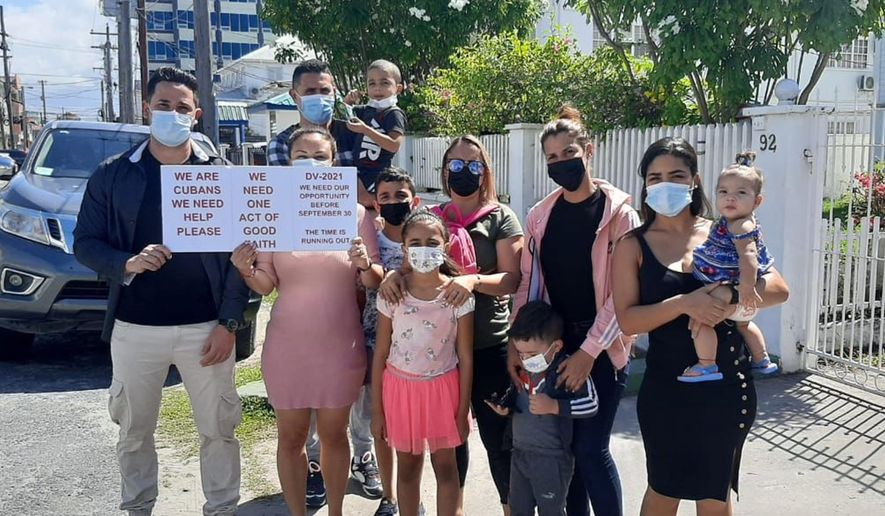Dorisnelly Fuentes Matos may have won the U.S. visa lottery on paper, but she still isn’t close to reaching the United States.
The 27-year-old Cuban economics student was notified more than a year ago that she won a coveted spot to seek one of up to 55,000 visas that the U.S. government gives out each year in a lottery to increase the country’s diversity. She filed the paperwork to a State Department processing center in Kentucky and waited to be scheduled for an interview at the U.S. embassy in Guyana, which handles Cubans’ visa applications.
But the interview never came. Now, the visas are set to expire Thursday, leaving her and her husband in limbo.
“We are desperate, asking for someone to help us because we are here in the middle of nowhere,” said Fuentes Matos, who is waiting in Guyana for an appointment and is one of thousands suing the U.S. government over the delays. “We are stuck in this country, and we can’t even go back to Cuba.”
More than 20,000 people have sued after they were declared winners of the visa lottery and turned in the required paperwork but never got an interview or a shot at coming to the United States. The government has issued about a quarter of the visas allotted for the fiscal year ending in September after processing was halted during the coronavirus pandemic and then resumed at a much slower pace as other visa applications got priority, their attorneys said.
A State Department official said the pandemic led to “profound reductions” in its capacity to process visas. While embassies and consulates have been instructed to try to prioritize the lottery cases, the U.S. likely won’t issue the number of visas it could for the soon-to-be-ending fiscal year, the official said.
That is what worries Fuentes Matos. As the deadline approached for visas to be issued, she grew nervous she would be asked to quickly attend a meeting with a U.S. consular officer in Guyana. So she and her husband gave up their jobs, sold their home and bought plane tickets to travel a circuitous route via Spain and Panama to Georgetown, where they have been staying in a hostel and waiting for the interview that still hasn’t come.
Winning the lottery is already a stretch. Millions of people sign up each year, and only up to 55,000 visas are awarded. The chance of getting a winning ticket is infinitesimal, and from there, they must wait in a line for a consular interview. Even in a typical year, not everyone will get one before the U.S. runs out of visas for the year.
For years, the U.S. was largely issuing the diversity visas that were allotted, with most going to people from Africa and Europe. After the pandemic hit, the Trump administration put a freeze on many green cards issued outside of the United States, including these visas. Some of the affected lottery applicants sued, and a federal judge last year ordered the administration to reserve 9,000 diversity visas into the next year.
The Biden administration lifted the freeze on green cards this year. But the State Department still hasn’t issued most of this fiscal year’s diversity visas, so another group of lottery winners now faces a similar predicament.
Curtis Lee Morrison, an immigration attorney representing thousands of diversity visa applicants, said some of his clients have sold cars and homes to pay for costs associated with the application, such as traveling to a third country for a consular interview. Applicants who are selected as winners and submit all the required paperwork showing they are eligible are still finding themselves out of luck due to the delays, he said. Morrison said clients found his firm via social media and despite the large number of plaintiffs, the suit did not have class-action status.
“When the diversity visa program was put into place, it was put into place as a diplomatic tool,” Morrison said. “The credibility of our tool, we’re losing it. Instead, we’re looking like fraudsters.”
Attorneys for the applicants have again asked a judge to reserve visas so they don’t expire. The U.S. government opposes the move, saying setting aside a large number of visas will give the plaintiffs better odds at getting a visa than lottery winners would normally have. U.S. District Judge Amit P. Mehta in Washington said he will make a decision before the visas are set to expire Thursday.
Fuentes Matos is counting on the judge to keep her hope of moving to the U.S. alive but said she was only given permission to stay in Guyana for three months. She said she is one of four families there waiting for a consular interview and doesn’t know what she will do if it doesn’t come through.
She decided to enter the visa lottery in the hope of building a better life for herself and her husband, who was working as a taxi driver in Havana.
“We left nothing in Cuba,” Fuentes Matos said. “We are going through very difficult times.”




Please read our comment policy before commenting.